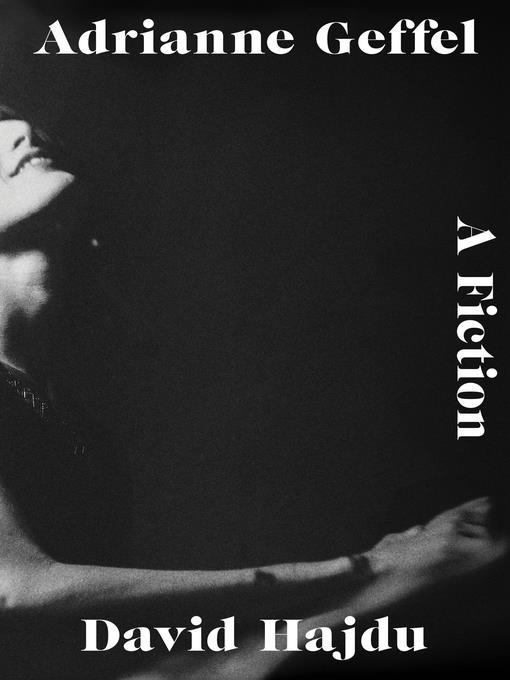
Adrianne Geffel
A Fiction
کتاب های مرتبط
- اطلاعات
- نقد و بررسی
- دیدگاه کاربران
نقد و بررسی

Starred review from July 6, 2020
Music critic Hajdu (Love for Sale) dissembles with tongue firmly in cheek in his inventive debut novel, which takes as its subject the “Queen of Bleak Chic,” a piano phenom who breaks out in the early 1980s after withdrawing from Juilliard. Pianist Adrianne Geffel has a neurological condition that enables her to express her feelings through music. Geffel emerges through an oral history told by her family members who reflect on her troubled childhood (she ran away at nine) and others. Many try to exploit her talent, such as a pompous fellow student at Juilliard who positions himself as her manager, or claim to understand it (“Readers interested in how musical art evolves... will be intrigued to read future pieces by me on Adrianne Geffel’s music,” writes a critic). After the oral accounts catch up to the height of Geffel’s success in the mid-’80s, they turn to her disappearance at the age of 26 and gain greater poignancy. The author establishes Geffel’s impact on American popular culture from the very beginning (one can be accused of “only geffelling,” “over-geffelling,” or “not geffelling enough”), which makes the various accounts of her credible and engaging all the way to the end. Hajdu’s vigorous send-up of the late-20th-century music scene sings.

July 15, 2020
A faux oral history of a sui generis performer in New York's avant-garde music world. In books like Positively Fourth Street (2001) and The Ten-Cent Plague (2008), Hajdu explored how countercultural folkies and comic-book artists rattled conformists in the 1950s and '60s. For his first novel, he attempts to do much the same for 1980s experimental music. Adrianne Geffel, we're told early, is a household name thanks to her passionate and defiant nature, possessed of a prodigious talent and impatience for musical strictures. Plus, a mysterious disappearance established a mystique that got her name-checked by the likes of Cardi B and George Saunders. The oral historian doesn't have access to Geffel herself, instead piecing her life together through interviews with family members, teachers, critics, and participants in New York's downtown scene who prized intellectualism and a certain abrasiveness. (Susan Sontag and Twyla Tharp were eager to witness this "doyenne of downtown music.") Despite (and thanks to) Geffel's idiosyncrasies, she was accepted into the Juilliard School, caught the ears of highfalutin Village Voice and SoHo Weekly News writers, and seemed destined to rise to the semifame of a Steve Reich or Philip Glass. In truth, though, Geffel is something of a MacGuffin, a way for Hajdu to satirize the kinds of people who can't appreciate genius when it's right in front of them or who wish to exploit it: the critics, the Oliver Sacks-like neurologist, the sketchy self-declared manager, the record-label executive. It's funny stuff, even if the targets are easy, though more of Geffel's presence would've been welcome. Writing fiction whose central character is a cipher presents a challenge to even the most accomplished novelists (see Myla Goldberg's Feast Your Eyes and Alan Hollinghurst's The Sparsholt Affair), and Geffel's own voice would've bolstered Hajdu's mythmaking. An entertaining satire about a musical genre not typically known for its humor.
COPYRIGHT(2020) Kirkus Reviews, ALL RIGHTS RESERVED.

September 1, 2020
Known for his excellent books on music and pop culture, including Love for Sale (2016), Hajdu presents his first novel. Written in the form of an oral history, it presents Adrianne Geffel, a brilliant young pianist and composer who gains fame and accolades for her arrhythmic avant-garde music. She also suffers from a rare neurological disorder. She became so famous that her name had fallen into common usage and thus the lingua franca of American culture. Since she remains an elusive figure, her life and career are revealed through interviews with her family members, romantic partners, music teachers, and musical team. Hajdu has fun name-dropping real-life artists (Sofia Coppola, George Saunders, Susan Sontag, Twyla Tharp) and making light of academia in the satirical mix. This may remind some readers of Rick Moody's work (one of his stories takes the form of liner notes), while the enigmatic Geffel has elements of Bob Dylan, Patti Smith, Laurie Anderson, and Lou Reed. Hajdu has created a weird and strangely wonderful fictional evocation of New York's 1970s and 1980s underground music and art scenes.(Reprinted with permission of Booklist, copyright 2020, American Library Association.)

Starred review from July 1, 2020
DEBUT The eponymous heroine of this debut novel from Hajdu (Lush Life), music critic for the Nation, is a pianist of abrasive originality and persuasive power who hears music playing constantly in her head and shares it with the world. Adrianne grows up humming yet reacts violently whenever she hears other music played--it clashes with her own music--and after puzzling family and friends in her small town briefly ends up at Juilliard. Soon, she's downtown New York's "new Queen of Bleak Chic," but emotional reconnection with an old friend who truly cares for her makes her change direction, shocking acolytes, and vanish before a key concert. The story unfolds as oral history, delivered mostly by those who celebrate their stake in her--her clueless parents, a controlling self-styled boyfriend--resulting in a portrait that's as much about the exploitation of the gifted as it is about the gift of music, of the artist's exterior situation as it is of the artist's interior world. Hajdu is excellent at articulating the vitality of Geffel's music while leaving what it actually sounds like to our imagination. VERDICT A reverberant and eye-opening portrait of an artist going her own way and finally saving herself; highly recommended. [See Prepub Alert, 3/11/20.]--Barbara Hoffert, Library Journal
Copyright 2020 Library Journal, LLC Used with permission.

























دیدگاه کاربران